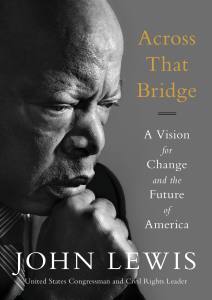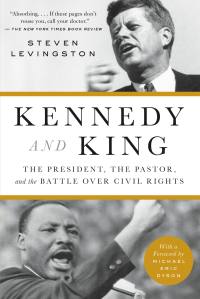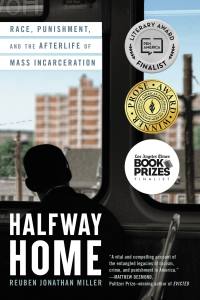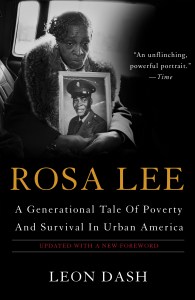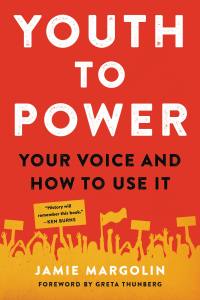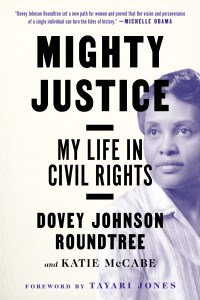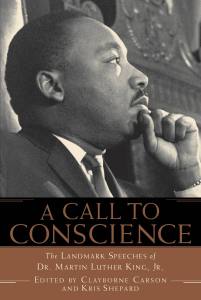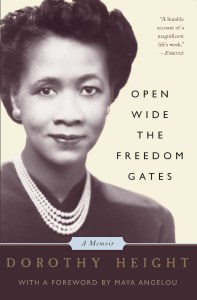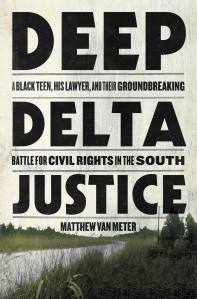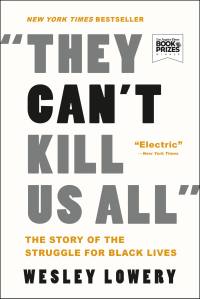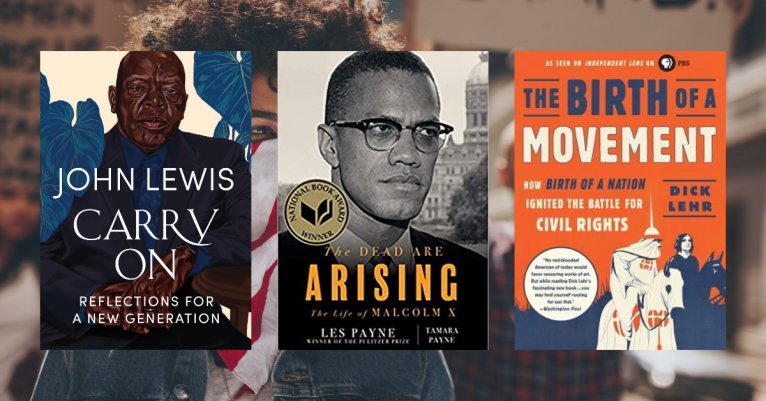Rosa Parks Arrest – Anniversary
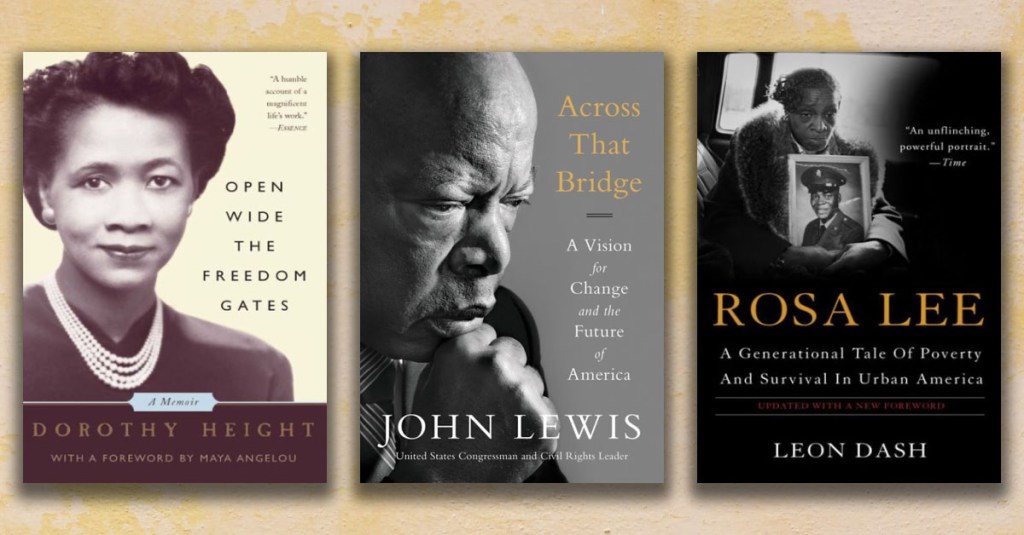
Reflect on the anniversary of Rosa Parks’ arrest with this collection of books that document the major moments in history which lead to and followed this major milestone in the Civil Rights movement.
In turbulent times Americans look to the Civil Rights Movement as the apotheosis of political expression. As we confront a startling rise in racism and hate speech and remain a culture scarred by social inequality, there's no better time to revisit the lessons of the '60s and no better leader to learn from than the late Representative John Lewis.
In the final book published before his passing, Across That Bridge, Congressman John Lewis draws from his experience as a prominent leader of the Civil Rights Movement to offer timeless wisdom, poignant recollections, and powerful principles for anyone interested in challenging injustices and inspiring real change toward a freer, more peaceful society.
The Civil Rights Movement gave rise to the protest culture we know today, and the experiences of leaders like Congressman Lewis, a close confidant to Martin Luther King, Jr., have never been more relevant. Despite more than forty arrests, physical attacks, and serious injuries, John Lewis remained a devoted advocate of the discipline and philosophy of nonviolence. Now, in an era in which the protest culture he helped forge has resurfaced as a force for change, Lewis' insights have never been more relevant. In this heartfelt book, Lewis explores the contributions that each generation must make to achieve change.
Now featuring an updated introduction from the author addressing the Trump administration, Across that Bridge offers a strong and moral voice to guide our nation through an era of great uncertainty.
Winner of the NAACP Image Award for Outstanding Literary Work/Biography.
“Kennedy and King is an unqualified masterpiece of historical narrative . . . A landmark achievement.” — Douglas Brinkley, New York Times bestselling author of Rosa Parks
Kennedy and King traces the emergence of two of the twentieth century’s greatest leaders, their powerful impact on each other and on the shape of the civil rights battle between 1960 and 1963. These two men from starkly different worlds profoundly influenced each other’s personal development. Kennedy’s hesitation on civil rights spurred King to greater acts of courage, and King inspired Kennedy to finally make a moral commitment to equality. As America still grapples with the legacy of slavery and the persistence of discrimination, Kennedy and King is a vital, vivid contribution to the literature of the Civil Rights Movement.
A "persuasive and essential" (Matthew Desmond) work that will forever change how we look at life after prison in America through Miller's "stunning, and deeply painful reckoning with our nation's carceral system" (Heather Ann Thompson).
Each year, more than half a million Americans are released from prison and join a population of twenty million people who live with a felony record.
Reuben Miller, a chaplain at the Cook County Jail in Chicago and now a sociologist studying mass incarceration, spent years alongside prisoners, ex-prisoners, their friends, and their families to understand the lifelong burden that even a single arrest can entail. What his work revealed is a simple, if overlooked truth: life after incarceration is its own form of prison. The idea that one can serve their debt and return to life as a full-fledge member of society is one of America's most nefarious myths. Recently released individuals are faced with jobs that are off-limits, apartments that cannot be occupied and votes that cannot be cast.
As The Color of Law exposed about our understanding of housing segregation, Halfway Home shows that the American justice system was not created to rehabilitate. Parole is structured to keep classes of Americans impoverished, unstable, and disenfranchised long after they've paid their debt to society.
Informed by Miller's experience as the son and brother of incarcerated men, captures the stories of the men, women, and communities fighting against a system that is designed for them to fail. It is a poignant and eye-opening call to arms that reveals how laws, rules, and regulations extract a tangible cost not only from those working to rebuild their lives, but also our democracy. As Miller searchingly explores, America must acknowledge and value the lives of its formerly imprisoned citizens.
PEN America 2022 John Kenneth Galbraith Award for Nonfiction Finalist
Winner of the 2022 PROSE Award for Excellence in Social Sciences
2022 PROSE Awards Finalist
2022 PROSE Awards Category Winner for Cultural Anthropology and Sociology
An NPR Selected 2021 Books We Love
As heard on NPR’s Fresh Air
Based on a heart-rending and much discussed series in the Washington Post, this is the story of one woman and her family living in the projects in Washington, D.C. A transcendent piece of writing, it won the Pulitzer Prize and the Robert F. Kennedy Journalism Award. For four years Leon Dash of the Washington Post followed the lives of Rosa Lee Cunningham, her children, and five of her grandchildren, in an effort to understand the persistence of poverty and pathology within America’s black underclass. Rosa Lee’s life story spans a half century of hardship in the slums and housing projects of Southeast Washington, a stone’s throw from the marble halls and civic monuments of the world’s most prosperous nation. Yet for all of America’s efforts, Rosa Lee and millions like her remain trapped in a cycle of poverty characterized by illiteracy, teenage pregnancy, drugs, and violent crime. Dash brings us into her life and the lives of her family members offering a human drama that statistics can only refer to. He also shows how some people — including two of Rosa Lee’s children — have made it out of the ghetto, breaking the cycle to lead stable middle-class lives in the mainstream of American society.
— Former Vice President Al Gore
“Dovey Johnson Roundtree set a new path for women and proved that the vision and perseverance of a single individual can turn the tides of history.”
—Michelle Obama
In Mighty Justice, trailblazing African American civil rights attorney Dovey Johnson Roundtree recounts her inspiring life story that speaks movingly and urgently to our racially troubled times. From the streets of Charlotte, North Carolina, to the segregated courtrooms of the nation’s capital; from the male stronghold of the army where she broke gender and color barriers to the pulpits of churches where women had waited for years for the right to minister—in all these places, Roundtree sought justice. At a time when African American attorneys had to leave the courthouses to use the bathroom, Roundtree took on Washington’s white legal establishment and prevailed, winning a 1955 landmark bus desegregation case that would help to dismantle the practice of “separate but equal” and shatter Jim Crow laws. Later, she led the vanguard of women ordained to the ministry in the AME Church in 1961, merging her law practice with her ministry to fight for families and children being destroyed by urban violence.
Dovey Roundtree passed away in 2018 at the age of 104. Though her achievements were significant and influential, she remains largely unknown to the American public. Mighty Justice corrects the historical record.
This companion volume to A Knock At Midnight: Inspiration from the Great Sermons of Rev. Martin Luther King, Jr. includes the text of his most well-known oration, “I Have a Dream”, his acceptance speech for the Nobel Peace Prize, and Beyond Vietnam, a powerful plea to end the ongoing conflict. Includes contributions from Rosa Parks, Aretha Franklin, the Dalai Lama, and many others.
After the fierce battles of the 1960s, Dr. Height concentrates on troubled black communities, on issues like rural poverty, teen pregnancy and black family values. In 1994, her efforts are officially recognized. Along with Rosa Parks, she receives the Presidential Medal of Freedom, the nation’s highest civilian honor.
2021 Chautauqua Prize Finalist
The "arresting, astonishing history" of one lawyer and his defendant who together achieved a "civil rights milestone" (Justin Driver).
In 1966 in a small town in Louisiana, a 19-year-old black man named Gary Duncan pulled his car off the road to stop a fight. Duncan was arrested a few minutes later for the crime of putting his hand on the arm of a white child. Rather than accepting his fate, Duncan found Richard Sobol, a brilliant, 29-year-old lawyer from New York who was the only white attorney at "the most radical law firm" in New Orleans. Against them stood one of the most powerful white supremacists in the South, a man called simply "The Judge."
In this powerful work of character-driven history, journalist Matthew Van Meter vividly brings alive how a seemingly minor incident brought massive, systemic change to the criminal justice system. Using first-person interviews, in-depth research and a deep knowledge of the law, Van Meter shows how Gary Duncan's insistence on seeking justice empowered generations of defendants-disproportionately poor and black-to demand fair trials. Duncan v. Louisiana changed American law, but first it changed the lives of those who litigated it.
Conducting hundreds of interviews during the course of over one year reporting on the ground, Washington Post writer Wesley Lowery traveled from Ferguson, Missouri, to Cleveland, Ohio; Charleston, South Carolina; and Baltimore, Maryland; and then back to Ferguson to uncover life inside the most heavily policed, if otherwise neglected, corners of America today.
In an effort to grasp the magnitude of the repose to Michael Brown’s death and understand the scale of the problem police violence represents, Lowery speaks to Brown’s family and the families of other victims other victims’ families as well as local activists. By posing the question, “What does the loss of any one life mean to the rest of the nation?” Lowery examines the cumulative effect of decades of racially biased policing in segregated neighborhoods with failing schools, crumbling infrastructure and too few jobs.
Studded with moments of joy, and tragedy, They Can’t Kill Us All offers a historically informed look at the standoff between the police and those they are sworn to protect, showing that civil unrest is just one tool of resistance in the broader struggle for justice. As Lowery brings vividly to life, the protests against police killings are also about the black community’s long history on the receiving end of perceived and actual acts of injustice and discrimination.
They Can’t Kill Us All grapples with a persistent if also largely unexamined aspect of the otherwise transformative presidency of Barack Obama: the failure to deliver tangible security and opportunity to those Americans most in need of both.
Continue your reading
Featured Content
Featured Content
By clicking ‘Sign Up,’ I acknowledge that I have read and agree to Hachette Book Group’s Privacy Policy and Terms of Use
